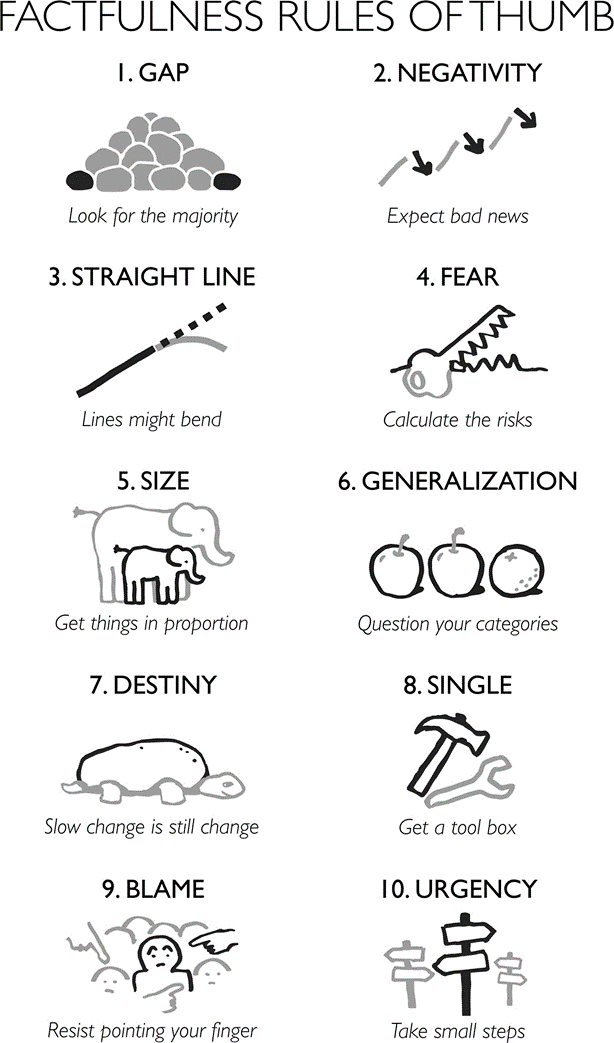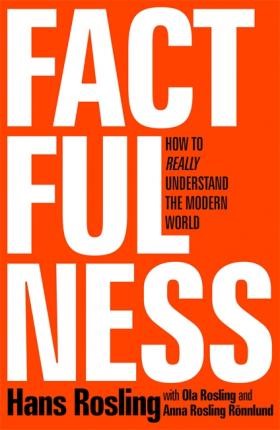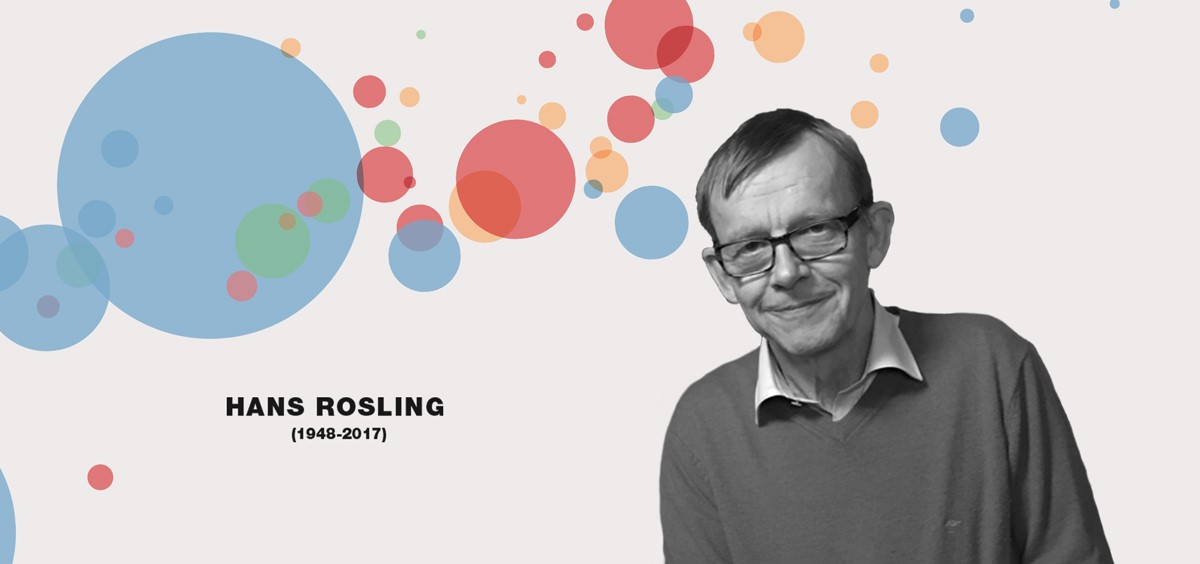12 October 2018

Here are some facts: Paris is the capital city of France; Chimpanzees are native to Africa and Birmingham City won the League Cup in 2010. The last fact might seem a little surprising, but it is still an indisputable fact. It is the truth. There are other things that we often assume to be ‘facts’, but are actually things that we simply assume to be accurate. We feel that we are instinctively right and fail to do the research. In his book ‘Factfulness’ Hans Rosling suggests that instinct can often distort the way in which we view the world. A key part of the book is based upon a multiple choice test, intended to identify how much, or little, people know about global trends. The questions are below have a go.
that we simply assume to be accurate. We feel that we are instinctively right and fail to do the research. In his book ‘Factfulness’ Hans Rosling suggests that instinct can often distort the way in which we view the world. A key part of the book is based upon a multiple choice test, intended to identify how much, or little, people know about global trends. The questions are below have a go.
1. In all low-income countries across the world today, how many girls finish primary school?
A: 20 per cent
B: 40 per cent
C: 60 per cent
2. Where does the majority of the world population live?
A: low-income countries
B: middle-income countries
C: high-income countries
3. In the last 20 years, the proportion of the world population living in extreme poverty has:
A: almost doubled
B: remained more or less the same
C: almost halved
4. What is the life expectancy in the world today?
A: 50 years
B: 60 years
C: 70 years
5. There are 2 billion children in the world today, aged 0 to 15 years old. How many children will there be in the year 2100 according to the United Nations?
A: 4 billion
B: 3 billion
C: 2 billion
6. The UN predicts that by 2100 the world population will have increased by another 4 billion people. What is the main reason?
A: there will be more children (aged below 15)
B: there will be more adults (aged 15 to 74)
C: there will be more very old people (aged 75 and older)
7. How did the number of deaths per year from natural disasters change over the last 100 years?
A: more than doubled
B: remained about the same
C: decreased to less than half
8. There are roughly 7 billion people in the world today. Which map shows best where they live? (Each figure represents 1 billion people.)
Where do you think most people live?

9. How many of the world’s one-year-old children today have been vaccinated against some disease?
A. 20 per cent
B: 50 per cent
C: 80 per cent
10. Worldwide, 30-year-old men have spent 10 years in school, on average. How many years have women of the same age spent in school?
A: 9 years
B: 6 years
C: 3 years
11. In 1996, tigers, giant pandas and black rhinos were all listed as endangered. How many of these three species are more critically endangered today?
A: all three
B: one of them
C: none of them
12. How many people in the world have some access to electricity?
A: 20 per cent
B: 50 per cent
C: 80 per cent
13. Global climate experts believe that, over the next 100 years, the average temperature will:
A: get warmer
B: remain the same
C: get colder
(The answers are at the end of this week’s items; a transparent ruse to get you to read the bulletin in its entirety).
 If you have failed to correctly answer most of the questions then don’t worry; you are in good company. At a series of important meetings and lectures Rosling asked the same questions of politicians, world leaders and the heads of global organisations. Those learned people all failed to. Why is the quiz so hard? It is because our instinct is to presume certain things to be true, often for negative reasons that contradict the evidence. Chimpanzees would perform more effectively because if A, B and C were written on 3 separate bananas they would select randomly; humans think they know the answer and therefore lean towards what they believe to be right. In addition to being wrong, the majority of people choose the most negative answers possible. Why is this? Rosling suggests instinct; a propensity towards negativity. To quote Mark Twain; "A lie can travel around the world and back again while the truth is lacing up its boots." It hard to retain a positive world view.
If you have failed to correctly answer most of the questions then don’t worry; you are in good company. At a series of important meetings and lectures Rosling asked the same questions of politicians, world leaders and the heads of global organisations. Those learned people all failed to. Why is the quiz so hard? It is because our instinct is to presume certain things to be true, often for negative reasons that contradict the evidence. Chimpanzees would perform more effectively because if A, B and C were written on 3 separate bananas they would select randomly; humans think they know the answer and therefore lean towards what they believe to be right. In addition to being wrong, the majority of people choose the most negative answers possible. Why is this? Rosling suggests instinct; a propensity towards negativity. To quote Mark Twain; "A lie can travel around the world and back again while the truth is lacing up its boots." It hard to retain a positive world view.
Teachers, students and parents can all be guilty of this too. Rosling identifies 10 areas in which our instincts lead us to think negatively regarding progress. We are drawn to the idea that things are getting worse,  when actually they are getting better. He outlines why humans often generalise, believe that extreme examples reflect the experience of the majority and that we expect things to be bad or to be getting worse. We believe that progress is a straight line, rather than a squiggle that can move backwards and forwards. We fail to get things in proportion, we don’t calculate risk accurately, think that a slow pace of change represents failure and often think that there is only one way to do or achieve something. We are also keen to blame others when things go wrong. All of these human traits manifest themselves in schools, as they do in any other community or place of work. As ever the challenge is to encourage teachers, parents and, most importantly, students to develop a more positive and analytical view. To do better than a chimpanzee.
when actually they are getting better. He outlines why humans often generalise, believe that extreme examples reflect the experience of the majority and that we expect things to be bad or to be getting worse. We believe that progress is a straight line, rather than a squiggle that can move backwards and forwards. We fail to get things in proportion, we don’t calculate risk accurately, think that a slow pace of change represents failure and often think that there is only one way to do or achieve something. We are also keen to blame others when things go wrong. All of these human traits manifest themselves in schools, as they do in any other community or place of work. As ever the challenge is to encourage teachers, parents and, most importantly, students to develop a more positive and analytical view. To do better than a chimpanzee.
Mr O’Sullivan
1: C, 2: B, 3: C, 4: C, 5: C, 6: B, 7: C, 8: A, 9: B, 10: A, 11: C, 12: C, 13: A
